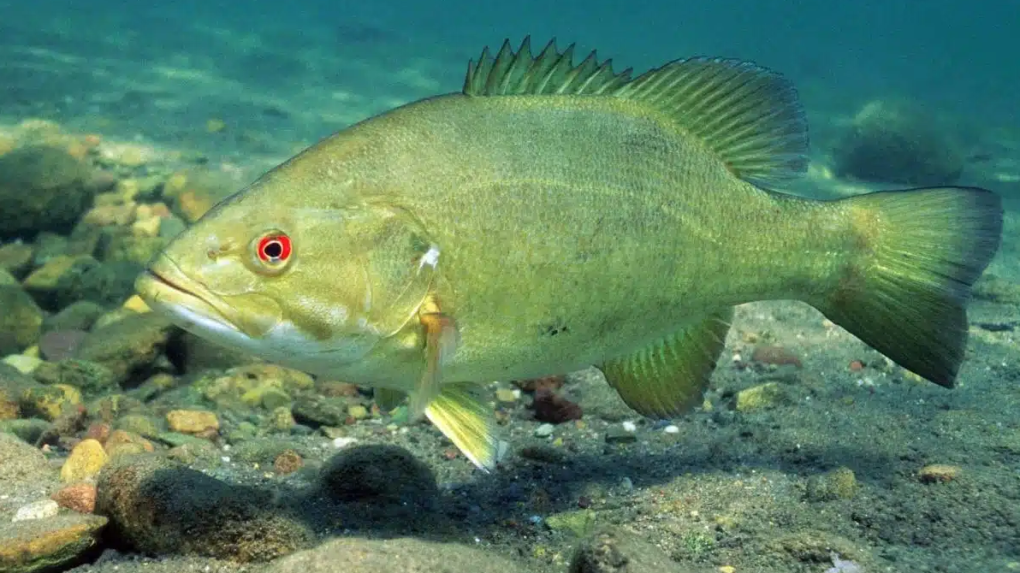B.C. asks anglers to help eradicate this sport fish common in the rest of Canada
 A smallmouth bass, considered an invasive fish in B.C., is pictured in this undated photo. (Invasive Species Council of B.C.)
A smallmouth bass, considered an invasive fish in B.C., is pictured in this undated photo. (Invasive Species Council of B.C.)
The British Columbia government is encouraging anglers to pack their tackle boxes and head out to a remote lake on Vancouver Island as the province attempts to eradicate an invasive population of sport fish.
The B.C. Ministry of Water, Land and Resource Stewardship says the invasive smallmouth bass were illegally introduced into Echo Lake, southwest of Campbell River, and have since threatened the survival of native salmon and trout.
"Smallmouth bass prey heavily on smaller fish and can out-compete native fish species," the provincial government said in a bulletin Tuesday, adding the situation could turn dire for local fisheries if the invasive bass make it into the nearby Campbell River watershed.
Last summer and into the fall, the ministry conducted an eradication operation on the lake, using gillnets and electrical current to stun or kill as many of the smallmouth species as possible, in a process known as "electrofishing."
Another round of monitoring and eradication will continue from now until October, in co-operation with the Indigenous non-profit A Tlegay Fisheries Society, the province says.
The government is encouraging anglers to fish for the bass in Echo Lake over the coming months and to freeze and report their catches to resource officers.
However, the government warns that transporting live bass between two or more bodies of water can be prosecuted under the B.C. Wildlife Act, with penalties for a first offence including a $100,000 fine and up to 12 months in jail. Second-time offences can carry a $200,000 fine and two years of incarceration.
The B.C. Wildlife Federation offers cash rewards of up to $2,000 for those who provide information about illegally transported fish if the information leads to a conviction.
'A serious threat'
While prevalent throughout eastern and central North America, especially in the Great Lakes region, smallmouth bass – also known as bronzeback or brown bass – were introduced into B.C. waterways as a sport fish, according to the Invasive Species Council of B.C.
The fish can live in streams, ponds, rivers and reservoirs, often propagating in sheltered, gravel-bottomed waterways with little vegetation, the agency says.
Female smallmouth bass can spawn multiple times per year, producing up to 10,000 eggs at a time, if water temperatures remain above a temperate 15 C, according to the society.
The species can be identified by their flat, oval-shaped body and pointed face with a mouth that extends forward from below the eyes. The fish are often greyish green in colour, with dark vertical stripes and a white belly. When fully grown, smallmouth bass can reach approximately 40 centimetres in length.
The B.C. government has identified the invasive smallmouth bass on parts of Vancouver Island, as well as in the Okanagan, Thompson, Cariboo and Kootenay regions.
"Smallmouth bass are predators, and feed on smaller fish, amphibians, and aquatic insects," according to the Invasive Species Council of B.C. "They have been known to deplete waterways of smaller fish and are considered a serious threat to native animals in the waterways they inhabit, including juvenile salmon."
The Ministry of Water, Land and Resource Stewardship did not immediately provide an estimate of how many smallmouth bass were culled in Echo Lake last year, or how many of the fish they believe remain. This story will be updated if and when a response is received.
CTVNews.ca Top Stories

WATCH LIVE From essential goods to common stocking stuffers, Trudeau offering Canadians temporary tax relief
Consumers will receive a temporary tax break on essential items and common stocking stuffers heading into the holiday season, Prime Minister Justin Trudeau announced Thursday, alongside a spring $250 rebate for 18.7 million Canadians.
Mother charged after infant dies in midtown Toronto: police
The mother of an infant who died after being found at an apartment building in midtown Toronto on Wednesday has been charged with failing to provide the necessaries of life.
2 arrested during Greenpeace protest outside Stornoway residence in Ottawa
Two people have been arrested following a protest outside Stornoway, the official residence of Canada's leader of the Opposition.
Arrest warrant issued for suspect charged in Toronto airport gold heist
Peel police say a bench warrant has been issued for the arrest of one of the suspects charged in connection with the gold heist at Pearson International Airport last year.
Son of Norway crown princess detained for one week in rape probe
The son of Norway's crown princess will be jailed for up to one week while police investigate accusations of rape made against him, a judge ruled on Wednesday.
Watch Dramatic video shows officers save driver from burning truck after brakes fail
Stunning video shows officers in Columbus, Ohio jumping into action to save a driver from his burning pickup truck.
Jussie Smollett's conviction in 2019 attack on himself is overturned
The Illinois Supreme Court on Thursday overturned actor Jussie Smollett's conviction on charges that he staged a racist and homophobic attack against himself in downtown Chicago in 2019 and lied to police.
Canadian painting found in barn, purchased for US$50 sells for hundreds of thousands at auction
An Emily Carr painting that sold for US$50 at an estate sale has fetched C$290,000 at a Toronto auction.
1991-2024 Sea Bears player Chad Posthumus dies at 33
Sea Bears centre Chad Posthumus has died at age 33.



























